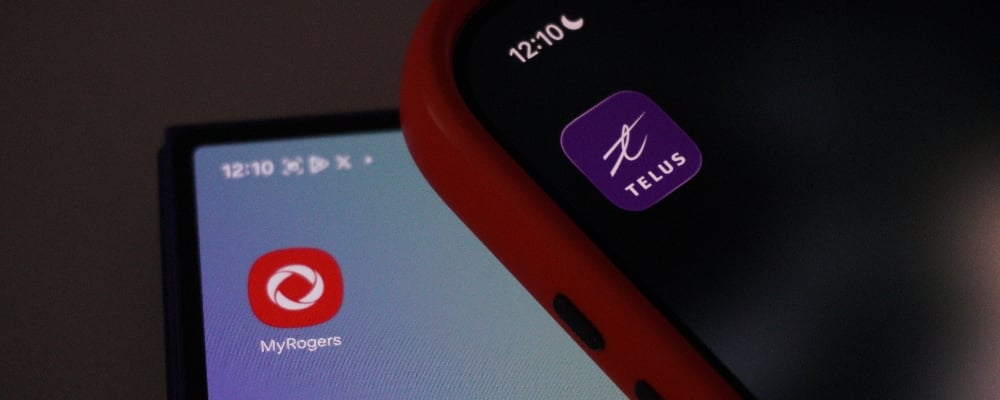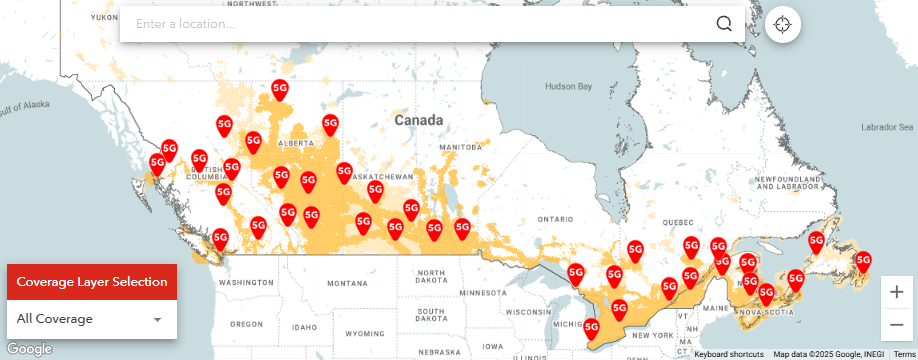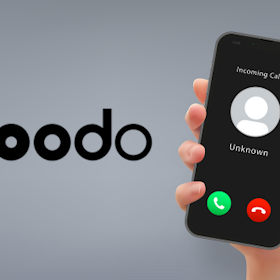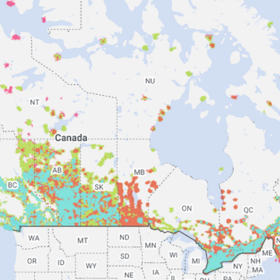
When it comes to Canadian wireless carriers, Rogers and Telus are two of the biggest names in 5G connectivity. The Big Three (Rogers, Bell, and Telus) essentially control Canada’s wireless market. Both Rogers and Telus promise expansive coverage, fast speeds, and flexible plans, but they differ in pricing, perks, and customer experience. Having extensively tested both Rogers and Telus this summer, I wrote this comparison to help you decide which provider fits your lifestyle.
Rogers is the carrier to consider if you want a slightly more affordable 5G unlimited plan. Telus is the best option for premium, stable 5G+ coverage, especially if you need high-speed data or plan perks like international calls and streaming bundles. When it comes to the average Canadian, I feel as though Rogers offers the best monthly value while offering reliable 5G service.
Let’s dive in and get into the weeds on whether Rogers' or Telus' plan fits your needs and budget.
Down to brass tacks: Rogers vs. Telus 5G carrier overview
Over the summer, I've been extensively testing the various Canadian carriers independently. After reviewing both Rogers and Telus on their own, I'm confident sharing which carrier offers the better value, coverage, and perks to make its plans more tantalizing.
| Rogers | Telus | |
|---|---|---|
| Plan prices | $75–$105/month | $85–$115/month |
| 5G networks and speeds* | Up to 1Gbps | Up to 2Gbps |
| Family plan discounts | As low as $25/line | As low as $55/line |
| Perks and extras | 3 months of Sportsnet | 3 months of Stream+ for $10 |
| WhistleOut rating | ||
| Shop plans | Shop plans |
The bottom line:
Rogers and Telus are both comparable carriers, with modest differences in their coverage and reliability nationwide. Rogers offers affordable 5G coverage in metro areas, including HD streaming and Canada-wide talk/text. Rogers' 100GB entry-level plan is cost-effective, but it offers limited 5G coverage outside major cities. Though, your monthly costs will be a bit cheaper, with sizeable savings over time.
Telus, on the other hand, provides superior 5G+ coverage, reaching many rural and suburban areas in Ontario, Saskatchewan, and Alberta, especially. Download speeds are much higher (up to 2Gbps), and the carrier includes perks such as the Stream+ bundle and Easy Roam. That all being said, your monthly costs will be higher. The inclusion of extra perks is an attempt to justify the high cost for heavy data users. But we don’t recommend paying more for perks unless you will actually use them.
Reviews and ratings: How we scored Rogers and Telus
At WhistleOut, we take a look at carriers and their services across five key metrics. This includes price, value, speed, coverage, and customer service. Each metric is rated out of five stars, which are averaged to calculate the overall score.
- – Price: 3 out of 5
- – Value: 4 out of 5
- – Data speeds: 3.5 out of 5
- – Coverage and network reliability: 4.5 out of 5
- – Customer service: 2 out of 5
Rogers' rating details
Rogers is a solid option for Canadians looking for affordable 5G service in metro areas. In downtown Toronto, 5G speeds consistently hit 250Mbps during peak hours. The network supports HD streaming, reliable talk and text, and hotspotting for occasional laptop use.
Rogers' downside is limited 5G coverage in rural areas and a modest perks selection on plans, though the Sportsnet+ three-month trial is a nice bonus.
You can check out our in-depth experience with Rogers' plan and see the results after strenuous testing.Telus' rating details
Telus provides premium 5G+ coverage across major cities and many rural areas. In testing, speeds regularly exceeded 300Mbps, and peak speeds on the 5G+ network approached 2Gbps in optimal conditions. The carrier includes useful perks like the Stream+ service, Easy Roam for US and international travel, and unlimited long-distance minutes in 27 countries.
The tradeoff is price when looking at Telus. The carrier's plans range from $80 to $110 per month on a bring your own device (BYOD) term. Telus rewards users with stable, high-speed data and additional services on its 5G plans.
You can learn more in my Telus review, where I tested Telus’ services and speeds for a full month.
Rogers vs. Telus price comparison
Both carriers offer three core plans at similar price ranges, with many options falling under $100/mo. Rogers supports its Essentials, Popular, and Ultimate plans. Essentials is the most entry-level wireless plan from the carrier, at $75 per month. Ultimate is the most expensive plan—priced at $105/mo. All plans offer 5G and 5G+ coverage with options for data allotments.
Telus also offers three plans: its 5G+ Complete, 5G+ Complete CAN-US, and 5G+ Complete Explore. Prices for the carriers' plans also vary but are slightly more expensive, between $85 and $115, for increasing data buckets, as well as talk and text perks.
Across its various plans, the difference in pricing between Rogers and Telus comes down to $10/month in costs, with similar allowances for data under the respective 5G network. But as you’ll see below, you can grab bigger family plan discounts from Rogers.Compare specific Rogers and Telus plans
Check out the postpaid unlimited plans offered by Rogers and Telus below:
| Rogers | Telus | |
|---|---|---|
| Plan | Essentials | 5G+ Complete |
| Mobile Data | 100GB | 100GB |
| Coverage | 5G | 5G+ |
| Speeds | 250Mbps | Up to 2Gbps |
| Perks and extras | HD streaming, 3% cash back with a Rogers Red credit card |
3 months of Stream+ for $10/month, 5-Year Rate Price Lock |
| Price | $75/mo | $85/mo |
| Shop plans | Shop plans |
Premium unlimited data plans
Rogers and Telus offer nearly identical unlimited data plans, so the differences all come down to the nuances of what each carrier provides. On the base plans, Rogers and Telus provide 100GB of monthly 5G data. Once you've exceeded this amount, the two service providers throttle service down to 512Kbps, which can still adequately handle emails and social media. So, from this perspective, both carriers can offer a nice baseline for your monthly plan. 100GB is ample for productivity, scrolling on social media and streaming Netflix or YouTube content.
Once we get into the higher-priced plans, that's when some of the complexities come in. Both Rogers and Telus provide 175GB and 250GB options atop their base plan. This gives far more flexibility for streaming and is more tantalizing for content creators hotspotting their smartphone to a laptop, uploading video files, or streaming games via the cloud. Rogers and Telus support reliable networks with fast data speeds. Rogers supports up to 1Gbps, while Telus supports a far superior ceiling of up to 2Gbps. However, reaching these speeds requires the stars to align under the best circumstances in most cases.
In the case of Rogers, monthly plans can reach upwards of $105/mo. For Telus, plans can get up to $115/mo. However, there is a way to save a bit of money. By setting up Autopay, you can get a $5/mo discount with Rogers. Telus offers a much more substantial discount of $25/month when setting up pre-authorized bank payments with the carrier. In both cases, if autopay isn't maintained, you'll be charged the original plan's price.
Rogers and Telus also offer plan discounts when bundling with their home internet packages. For instance, you can get Rogers' Essentials plan for $55/mo when bundling internet or TV services. Similarly, Telus offers up to $360 in discounts when bundling mobility and home services together over a two-year term.
Plan perks
Rogers and Telus offer perks and bonuses to incentivize customers signing up to the available unlimited data plans. The higher the tier, the more perks are included in the plan. Pound for pound, Telus offers more perks with its monthly plan.
One of the most tantalizing perks is getting Stream+ for $10/month for the first three months. Stream+ service is also a major benefit for someone like me. As I already subscribe to Netflix, Amazon Prime and Disney+, being able to bundle them all together and save a bit each month is great. Afterwards, the bundled price is $23, which offers a considerable discount when taking into account what the services cost à la carte.
Here's a complete list of Telus' perks on the 5G+ Complete plan:
- Nationwide data, talk, and text
- Unlimited long-distance minutes for calls to 27 international destinations
- Unlimited international messaging
- Get Stream+ for $10 per month for 3 months
- 5-Year Rate Plan Price Lock
- Easy Roam from $5/day
Rogers vs. Telus family plans
Customers can find savings by way of family plans from Rogers and Telus. By increasing the number of lines on a single account, customers can unlock monthly savings. The more lines on an account, the greater the discounts per line. For the most value and benefits, customers will have to have four or more lines on one account.
Looking between the two carriers, Rogers comes out on top with a clear victory in its family plan structure. With a four-line family plan on the Essentials tier, you can pay as little as $53/mo. for your fourth line and after. But if you want to split the cost of four lines equally, you’ll come out to roughly $63 per line. Customers can also mix and match tiers on each line, though pricing will be reflected in which plans are chosen.
You can see a more in-depth look at discounts per number of lines in our breakdown of Rogers' family plans.| Plan | First line | 2nd line | 3rd line | 4th line+ | Total for four lines |
|---|---|---|---|---|---|
| Essential | $75/mo | $67/mo | $60/mo | $53/mo | $225/mo |
| Popular | $85/mo | $77/mo | $70/mo | $63/mo | $220/mo |
| Ultimate | $105/mo | $97/mo | $90/mo | $83/mo | $300/mo |
Telus also offers savings under its family plan option. Here, plans go as low as $65/mo for the fourth line on the account.
Here’s a table of Telus' family plan discounts and prices for each line:| Plan | First line | 2nd line | 3rd line | 4th line+ | Total for four lines |
|---|---|---|---|---|---|
| 5G+ Complete | $80/mo | $72/mo | $70/mo | $65/mo | $287/mo |
| 5G+ Complete Canada-US |
$90/mo | $82/mo | $80/mo | $75/mo | $327/mo |
| 5G+ Complete Explore |
$105/mo | $97/mo | $95/mo | $90/mo | $345/mo |
Rogers is clearly the winner in family plan savings as there's a $32/month difference between the two carriers. In the best circumstances, with four lines on Telus' 5G+ Complete plan, you and your family will still be paying more each month.
The difference in pricing is emphasized even more when we look at annual costs between the two carriers. For a family of four on Rogers' Essential plan, you'll spend $384 less than with Telus.
4 lines of Rogers' Essential plan ($255/mo) x 1 year = $3,060 annually per family
4 lines of Telus 5G+ Complete ($287) x 1 year = $3,444 annually per family
It's also worth noting that Rogers and Telus allow for more than four lines to be activated on a single account. However, there are no additional savings for the fifth, sixth, etc. line that's activated. Everything beyond the fourth line is capped at the same discount.
Rogers vs. Telus mobile network coverage and speeds
In Canada, 5G network coverage is becoming more and more accessible. Both Rogers and Telus offer 5G access by way of their monthly plans. Although the two still support 4G LTE networks, the default offering is 5G when applicable. Rogers has a well-established 4G LTE network coast to coast and is building out its 5G infrastructure slowly but surely. That said, Telus' network is more reliable than Rogers' as its 5G+ coverage is available across more metro areas and even more rural spaces.
Rogers coverage map

Image: Rogers
Rogers has an expansive 4G LTE network that reaches 97% of the country's population. The 4G LTE network provides download speeds of upwards of 100Mbps, which, for many Canadians, will be suitable for checking emails and scrolling through social media. When looking at the 5G network from Rogers, access to speeds of up to 250Mbps typically falls within the areas of major metro cities like Toronto, Vancouver, and Montreal.
Having been on the Rogers network for quite a while, Rogers' 5G connectivity rarely fails to be reliable. However, the carrier did experience a country-wide outage in 2022, where 12 million Canadians were left without wireless and hard-wired services for around 15 hours.Telus coverage map

Image: Telus
Telus has one of the most expansive coverage maps in Canada (sharing the same towers as Bell). The carrier's 4G LTE network spans 99% of the population, operating coast-to-coast. If you're in a rural area, you'll likely find yourself able to connect to Telus' LTE service by default. If you're in a more metro area or on the outskirts of a larger city, chances are you'll have access to the carrier's 5G and 5G+ network.
As of 2025, Telus' 5G and 5G+ infrastructure is the best in the country. Taking a look at provinces like Ontario, Alberta, and Saskatchewan, Telus' 5G network is largely available to customers around any major city.Customer service
Contacting customer service is a tiresome chore, no matter the circumstances. The results are also very subjective. I put Rogers' customer service to the test a couple of months ago. While attempting to speak to a representative, I spent over 20 minutes on hold. Once I got through, I was frustratingly expected to conduct all account-specific changes on the MyRogers account rather than through the representative. It was as if I were bothering the other person on the line.
Contacting Telus' customer service offered a similar experience. I was stuck on hold for 20 minutes, after trudging through the carrier's site for a contact number. After reaching a representative, the person I spoke to was much more willing to help me over the phone. The representative was knowledgeable and walked me through an explanation of my bill.
Rogers and Telus both support an extensive app on iOS and Android. Unless it's a dire account issue, I'd suggest going using the app rather than spending time on hold with the carrier. The MyRogers and My Telus app allows you to look at your bills, upgrade your device or plan, and monitor your monthly data usage. Telus' app also supports an AI-powered chatbot to answer basic inquiries.Final recap: Is Rogers or Telus better for you?
From a top-level perspective, Rogers and Telus offer similar plans with little to no differences in data allotments, as well as talk and text benefits. That being said, when it comes to "which is better?", we have to keep two major considerations in mind. The first being pricing—regardless of how good a carrier may be, it has to be affordable and sustainable for Canadian customers. The second is coverage within the country.
If you'd like to save some cash each month on your monthly plan, Rogers is the carrier for you. As we've discovered, Rogers' monthly plans are cheaper by $5/mo by default. Plus, Rogers' family plan discounts can offer up to $384 a year in savings when compared to Telus' plans. Traditionally, Telus' plans are more expensive from a base value.
If you live in a major metro city, where access to reliable 5G coverage is important, my recommendation is to go with Telus as your next provider. The carrier's 5G and 5G+ network far exceeds that of Rogers currently. In areas like Southern Ontario, Central Saskatchewan, and Alberta, Telus' 5G service is easy to find. With this and Telus' plan perks, you might end up paying more per month but get more out of your monthly plan if you're in a metro area.
Switch to Rogers or Telus
Both carriers allow easy BYOD sign-ups and eSIM activation. Be sure to check coverage maps before committing to ensure you’ll get the desired speeds in your area. And if you decide to swap, we can also walk you through how to swap carriers while still keeping your existing number.
How WhistleOut rates cell phone plans
WhistleOut evaluates phone plans based on the following criteria:
- Price & value: Not all cheap plans are “bad,” and not all expensive plans are worth it. We look at everything a plan includes and compare it both to other plans from the same carrier, as well as similar plans from competitors in the market, to determine whether the value is consistent with the price.
- High-speed data: Also called “premium” data, this is how much data you get at full 4G/5G speeds before they can or will slow down. The more guaranteed high-speed data the plan includes, the better experience you’ll generally have—but there’s also usually a limit to how much you actually need, and we ensure that you’re not overpaying for data that will go unused.
- Coverage & network reliability: The breadth of each carrier’s 4G LTE and 5G networks determines your reception and service. Particularly in the case of 5G, some carriers offer far more robust coverage than others, which affects how their phone plans perform in different parts of the country.
- Plan extras and perks: In addition to the basics—talk, text, and data—some plans throw in freebies like hotspot allowances, cloud storage, entertainment subscriptions, or service discounts.
Our mobile experts tested Rogers and Telus for at least a month each, in addition to leveraging proprietary data and real-world customer feedback. We compared the two carriers by analyzing their coverage, cost, and plan options. We considered plan-specific elements, including perks, premium data allowances, and customer service. After performing hands-on testing and extensive research, we picked the best carrier we felt met the needs of most people. In some areas, each carrier stacked up equally. We only compared Rogers versus Telus; no other carriers, big or small, were included in our comparison testing.
Visit our guide to choosing a phone plan to learn more about cell phone carriers and plans, and find the one that best meets your specific needs.FAQs
Steve Vegvari

Steve Vegvari is a 10-year writer in the gaming and tech space, writing for several Canadian publications. He's covered everything from the latest marquee games and hardware to smartphones, smart home devices, TVs, and smart lights. Steve emphasizes his love of weird, experimental tech while uncovering the pros and cons of the Canadian mobile market.
Related Articles
Related Topics
Rogers Wireless Telus Rogers Cell Plans Big Carrier VsPopular Topics
Android Apple iPhone Samsung Google iOS Cell phone plans Rogers Telus BellFind Better Phones and Plans
Hundreds of cell phone plans unpacked. All the facts. No surprises.








































